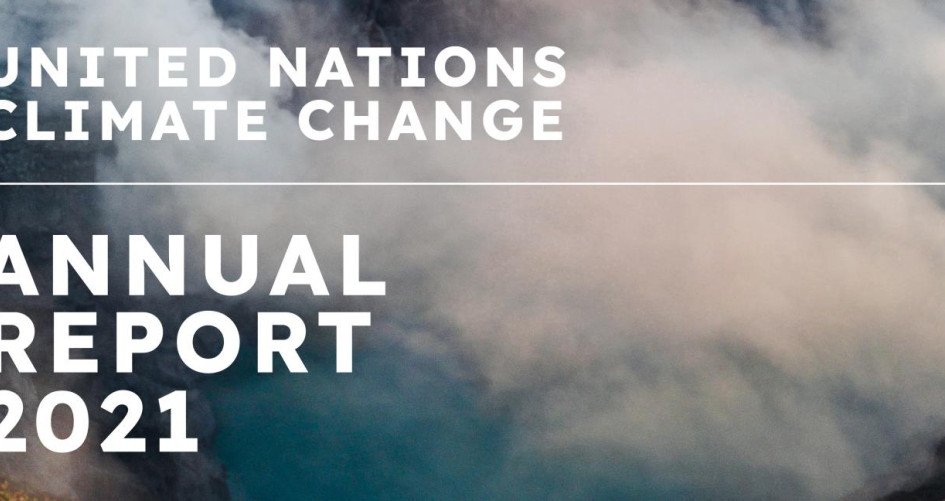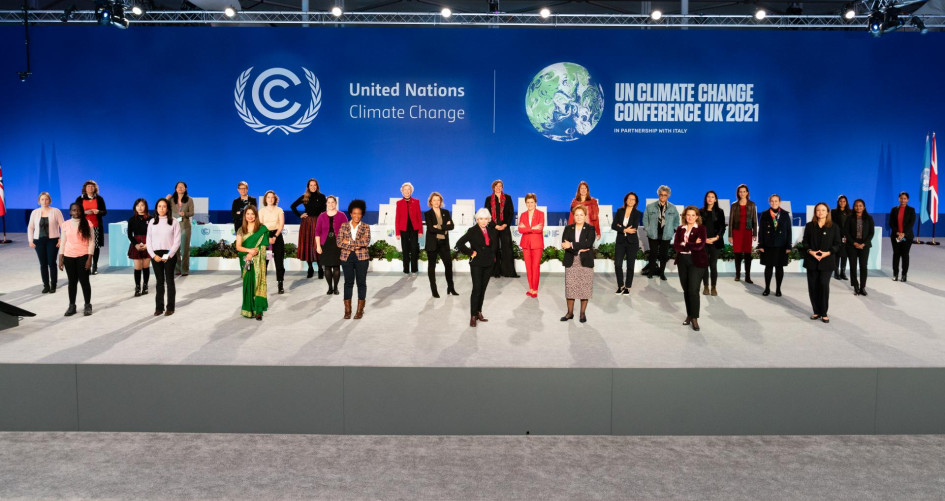Supporting implementation
While raising ambition is necessary, as underscored by science, implementing existing agreements at pace is also important. COP 26 brought together over 120 world leaders and a record 38,459 representatives of government, civil society, business and youth from almost 200 countries with the aim of turning the 2020s into a decade of climate action and support.
After over two weeks of intense negotiations, Parties adopted the Glasgow Climate Pact and other decisions aimed at strengthening efforts to build resilience to climate change, curbing greenhouse gas emissions and providing the necessary finance for both.
In 2020, the Executive Secretary encouraged an open channel of communication with non-governmental organization constituencies in a consultative planning process on good practices of public participation and access to information relating to NDCs and NAPs. The open channel of communication led to the implementation of new measures at COP 26 relating to the facilitation of advocacy, including the facilitation of the ‘People’s Plenary’ on the last day of the conference.
As well as providing logistical and organizational support, the secretariat assisted in procedural and legal matters pertaining to convening the sessions of the governing and subsidiary bodies. The secretariat also supported the Paris Agreement Implementation and Compliance Committee and the Kyoto Protocol Compliance Committee.
Data and information for implementation
An important part of ensuring accountability and transparency for implementation is the provision of data and information, which is also supported by the secretariat.
Reporting greenhouse gas (GHG) emissions. Determining how and from where GHGs are being emitted is an important basis for climate action. The secretariat prepared and published the aggregate GHG information report, the GHG data report and the compilation and accounting report and addendum, in accordance with its mandates. It also prepared and published status reports in support of the GHG review process.
Review of annual information submitted by Annex I Parties on greenhouse gas inventories. Ensuring that Parties’ submissions are subject to review is an essential component of the MRV process and of promoting transparency. The secretariat organized reviews for Annex I Parties in accordance with its mandates, including the preparation of annual review reports. In addition, the secretariat prepared annual reports to the SBSTA on the technical review of GHG inventories and other information reported by Parties included in Annex I.
Accounting under the second commitment period under the Kyoto Protocol. To enable assessment of Parties’ compliance with Article 3 of the Kyoto Protocol, total aggregated emissions and removals by Annex I Parties in the second commitment period of the Kyoto Protocol are monitored and precise records are kept of the Kyoto Protocol mechanisms, including the clean development mechanism and the use of units from land use and land-use change and forestry. The Kyoto Protocol established a rigorous MRV system and a compliance system to ensure transparency and hold Parties to account, and the secretariat had a vital role in supporting those systems.
Accounting of certified emission reductions. The secretariat continues its role in ensuring the accurate accounting of the issuance, holding and acquisition of certified emission reductions of the clean development mechanism. There was a 42 per cent increase in the issuance of certified emission reductions for 2021 compared with 2020 (101 million versus 70.9 million), the highest amount issued since 2017. There was also a more than 90 per cent increase in the number of certified emission reductions voluntarily cancelled (37.1 million in 2021 versus 19.4 million in 2020). The secretariat also began a new partnership with AirCarbon Exchange, the world’s first digital carbon exchange, to promote carbon offsetting through the purchase of certified emission reductions. The United Nations carbon offset platform is a service of the clean development mechanism registry that allows the public to purchase certified emission reductions online for voluntary cancellation.
Engaging indigenous peoples and local communities. The work of the LCIPP was made more widely accessible by operationalizing the LCIPP web portal. The portal offers concrete ways for LCIPP contributors to access resources and events.
Providing tools, methodologies and data. As the challenges of climate change are similar in many countries, the secretariat has a role in providing access to useful tools and methodologies. The Law and Climate Change Toolkit was expanded to support the establishment of national climate change legislation and showcased at the Law and Governance Day 2021, which was conducted in conjunction with COP 26.
The secretariat supported the integration of remote sensing and ground data to help estimate land sector GHG emissions and removals, and the estimation of the mitigation potential for GHG emissions.
Engagement to enhance implementation
The secretariat also enhanced implementation across mitigation, adaptation and finance.
Implementing country plans. NDCs, national adaptation plans (NAPs) and LT-LEDS all set out national plans for action. The Implementation Labs, delivered at the regional climate weeks, provided a space for national government representatives and non-Party stakeholders in each region to have an open and solution-oriented dialogue on priorities and needs of countries for implementing these plans.
The Collaborative Instruments for Ambitious Climate Action Initiative, established by the secretariat to assist Parties in developing carbon pricing instruments and implemented with the assistance of the RCCs, delivered activities across the regions.
Stimulating the uptake of climate technology. Technology development and transfer has an important role to play in both mitigation and adaptation action. The TEC and the Climate Technology Centre and Network, with the support of the secretariat, prepared a joint publication providing a comprehensive analysis and synthesis of information on technology needs and challenges, linkages between policy and implementation, and linkages between NDCs and NAPs.
The TEC extended its collaboration within the secretariat and with external partners at the regional and global level and published a series of technical papers and policy briefs that advanced climate technology solutions. With the assistance of the Climate Technology Centre and Network, the TEC published a technical paper on enabling environments and challenges to technology development and transfer identified in technology needs assessments, NDCs and relevant TEC briefs to deliver relevant key messages and recommendations to Parties at COP 26.
Furthermore, in collaboration with different stakeholders, including high-level champions and the RCC, the TEC hosted three events at Asia-Pacific Climate Week. The event included discussions on the role of innovation and emerging technologies in enabling a sustainable transition of the energy supply sector in the Asia-Pacific region and reaching net zero emissions by 2050.
During Africa Climate Week, the secretariat, in collaboration with RCC Kampala, organized a thematic session on advancing electric mobility in Africa. This event showcased examples of e-mobility solutions implemented in Africa and discussed policy options for accelerating the upscaling and diffusion of successful technological solutions in the region. Outside of climate weeks, the secretariat organized a webinar to assist countries in developing their project ideas to the level of being recognized and supported by financial institutions.
Building capacity. Capacity-building is key to strengthening climate change adaptation and mitigation and cuts across all areas of work at the secretariat. In June, the 10th Durban Forum on capacity-building was organized with support from the secretariat and was attended by approximately 120 capacity-building stakeholders who discussed capacities for addressing climate and development goals.
At the 5th meeting of the Paris Committee on Capacity-building (PCCB), held virtually with the support of the secretariat, the PCCB and more than 170 observers met to discuss progress in the work of the PCCB. The 3rd Capacity-building Hub, a week-long event series at COP 26 that was organized by the PCCB with secretariat support, attracted over 4,700 participants who discussed a wide range of urgent capacity-building issues under different thematic areas such as adaptation and resilience, and finance and technology. The PCCB created an informal coordination group for capacity-building as a key vehicle for representatives of constituted bodies, operating entities and relevant UNFCCC processes to coordinate climate change related capacity-building plans and activities. The PCCB Network, coordinated by the secretariat on behalf of the PCCB, had reached 276 member institutions worldwide by the end of 2021 and implemented more than 20 activities, including training workshops, regional meet-ups, podcasts and newsletters.
Implementation by non-Party stakeholders. The secretariat engaged widely with cities, regions, businesses and investors to support implementation of their own actions on climate change and to inspire others to take action. COP 26 included more than 100 events related to climate action, including more than 70 innovative and inspiring sessions at the Climate Action Hub.
The United Nations Global Climate Action Awards shine a light on the enormous groundswell of activities under way across the globe that are moving the world towards a highly resilient, low-carbon future. A total of 11 game-changing initiatives received a Global Climate Action Award for their innovative, scalable and practical climate actions. Sector action is also important, and the Sports for Climate Action Framework adopted a new set of commitments aligned with the 1.5° C goal, including by reducing their climate footprint by 50 per cent by 2030. The signatories of the Fashion Industry Charter for Climate Action agreed to a decarbonization plan that aligns with Paris Agreement, with ambitious actions set throughout the sector, including the supply chains.
Engagement on adaptation. The Least Developed Countries Expert Group launched the year-long celebration of 20 years of supporting the least developed countries on adaptation. This milestone affirmed that the work of the Group and its support for adaptation to least developed countries is of paramount importance. It continued to provide support directly to countries through the Open NAP initiative by assisting national experts in the African least developed countries in drafting NAPs. By the end of 2021, 31 NAPs were available on NAP Central, which is 11 more than in 2020.
To ensure the provision of technical support to developing countries in the process of formulating or implementing NAPs, the secretariat established UN4NAPs, a United Nations system-wide partnership initiative.
RCC Dubai supported the preparation and delivery of the two virtual technical workshops to close priority knowledge gaps in the Gulf Cooperation Council/West Asia and North Africa subregions under the implementation of the Lima Adaptation Knowledge Initiative. The UN Climate Change and Universities Partnership Programme, coordinated by the Nairobi work programme, provides graduate students with the opportunity to work closely with local, national and regional partners in undertaking projects as part of their master’s thesis in countries including Namibia, Nepal, Peru and Seychelles. The projects were focused on producing tangible outputs to enable countries and subregions to adapt to climate change.
Accessing climate finance. Climate finance will be key for Parties to expeditiously implement their NDC and NAPs. The secretariat supplements its support to intergovernmental work by facilitating access of developing countries to climate finance at the country and regional levels. This includes supporting countries in identifying their finance needs, setting climate finance strategies to meet those needs and matchmaking countries with financiers to implement those strategies. The Needs-based Finance project, as mandated at COP 23, progressed in more than 100 countries and regions participating despite the pandemic. Several regional technical assessments on climate finance were conducted, regional climate finance mobilization and access strategies, including project pipelines were developed, and arrangements for implementation with partners were concluded. RCC Dubai supported the needs-based finance team in the Arab States and RCC Lomé supported the development of the Needs-based Finance project in West Africa.
The secretariat was also able to help mobilize finance, for example RCC Lomé raised USD 200,000 from the West African Development Bank to support the establishment of the Academy for Global Youth Leadership Empowerment hub in Africa and the development of a course curriculum and the mapping of regional institutions that are leading in climate action.
A series of events on climate finance were organized by the secretariat, including webinars on the role of microfinance in the replacement or acquisition of appliances and on trusts and forest funds for results-based payments and payments for services schemes. Information exchanges between countries and climate finance institutions were facilitated through the secretariat’s support of the Standing Committee on Finance Forum on finance for nature-based solutions.
Inclusive implementation. To ensure inclusivity of climate action, together with Parties and other stakeholders, the secretariat sought to galvanize support for the establishment of ambitious new commitments on gender-responsive and transformative climate action. Such commitments were announced at a high-level event, hosted by the United Kingdom in collaboration with the secretariat, on Gender Day at COP 26.
At the Latin America and Caribbean Climate Week, the Government of Antigua and Barbuda, RCC St. George’s, the United Nations Children’s Fund, the Caribbean Youth Environment Network, and other regional partners launched the Academy for Global Youth Leadership Empowerment in the Caribbean, which builds on and adds value to existing regional youth engagement frameworks. The PCCB, with the support of the secretariat and in collaboration with the PCCB Network, organized a virtual event series at the regional climate weeks to provide a platform for regional dialogues to explore the role of youth in capacity-building and to share best practices for engaging youth in capacity-building for NDC implementation and resilience-building.
Engaging broadly. The reach and engagement across the secretariat’s social media channels were over 1,600 per cent higher during COP 26 than COP 25, driven by increased public interest in climate change and strategic partnerships with key digital companies. Strategic collaboration with all major digital platforms, including Facebook, Google, Twitter and YouTube was established. With more than 4,000 journalists in attendance, the Glasgow Conference saw a record number of media representatives attending a United Nations Climate Change Conference: more than 260 press conferences for Parties, observers and United Nations agencies were organized over the two weeks.





